Colin Eric Allen was born at the same hospital in Ashley Road, Boscombe, Bournemouth as Zoot Money, only four years previously on 9th May, 1938. The Allen family, mother Bessie, father Ernie, or ‘Jim’ to his mates, Colin and his younger sister Jean, spent their formative years in an overcrowded house in Naseby Road, Moordown, with Ernie’s older brother and his family of six. He initially attended Winton and Moordown School, but his stay was cut short in 1947 when the family upped sticks and moved away from the cramped conditions in Moordown to a council house of their own in the somewhat less salubrious surroundings of West Howe Road (now renamed South Kinson Drive). Back in the day, West Howe had a reputation for being one of the roughest areas in Bournemouth and living there was hazardous for a new kid on the block, as a whack around the ear from one of the local toughs became a regular occurrence, until Colin found out he was fleet of foot and could outrun them. From the age of eleven, he attended East Howe Secondary Modern School (now the Bourne Academy) and in the summer holidays would occasionally accompany his dad on his rounds, as he was a drayman for the now defunct Eldridge Pope Brewery in Dorchester.
He left school at Christmas 1953 and in the new year took up a five-year apprenticeship as an aircraft fitter at the De Havilland Aeronautical Technical School in Somerford. Two years later, the Allens moved house once again to the relative luxury of a brand new council house in Moorside Road, a mere half a mile away in distance from his old home but a million miles away as far as mod cons were concerned. For the first time they could summon up electricity at the flick of a switch instead of igniting a gas mantle and fill a tub at the turn of a tap, rather than topping up a tin bath in the kitchen using warm water from the copper (a large stand-alone boiler used for washing laundry). As a teenager, Colin became a handy table tennis player and also developed a liking for modern jazz through the records of Stan Kenton and Dave Brubeck. Like most kids in the fifties, rock ‘n’ roll also caught his attention, particularly Chuck Berry and Little Richard, but the New Orleans pianist Antoine ‘Fats’ Domino was his firm favourite. As his taste for jazz developed, one record caught his ear, Duke Ellington’s “Skin Deep”. Ellington’s drummer, Louis Bellson, tapped out a short mambo beat on a cowbell and tom-tom. It was the light bulb moment that set Colin on the road to becoming a professional drummer.


Colin in Moorside Rd with his Mini in 1970 and the former Allen family home today (Photograph on the left Colin Allen and on the right John Cherry)
An apprentice wage of thirty-six shillings and five-pence a week didn’t stretch to a drum kit, so he would beat out rhythms on the fireguard in his front room with a pair of his mother’s knitting needles while listening to the radio. Eventually, he heard of an acquaintance who had an old drum set for sale and after much haggling, a deal was done. The kit was his for the princely sum of five pounds and Colin’s imitation suede jacket that his mate had been coveting. He set up the drums at home and randomly flailed around, annoying the neighbours, until he decided it was time to seek guidance from a professional and signed up for lessons with a stalwart of the Bournemouth jazz scene, Jack Horwood. Early in his drumming career, he undertook his first public performance at a skiffle contest held at the Moderne Cinema in Winton. A gaggle of eight or nine mates called The Jesters failed to impress the judges, although Colin tasted relative success as part of The Red Star Skiffle Group as he was drafted in by fellow De Havilland apprentice, Colin Perry, to cover for their absent percussionist. The Red Stars came in second to The Dowland’s and the Drovers. The rest of The Jesters were not impressed. Colin’s first paid work, however, was a dep job with the Weymouth All-Stars on a pleasure steamer. Not ideal conditions for a first gig as his kit swayed back and forth on the choppy voyage around the bay, but he got away with it.
The lessons with Jack reaped dividends when he was deemed competent enough to deputize for his tutor at a tea dance at the Cumberland Hotel with the Alan Kay Quartet. The gig was a steep learning curve as one piece proved difficult, and the bass player took it upon himself to yell out instructions to stop him from getting lost. Over time, Colin gained in confidence and picked up more work with Dixieland Trad bands, piano jazz combos and a residency with the Barry King Trio at the Ossemsley Manor Country Club, where sticks were strictly forbidden because of volume issues and he had to keep the beat with a pair of brushes. Eventually he was invited to become a member of the Alan Kay Quartet (Kay was actually saxophonist / flautist Alan Melly) joining pianist Don Hardiman, Stan Galton on bass and Jack Horwood who switched to vibraphone allowing Colin to take over on the traps (an earlier version of the band had Pete Riley on bass and Freddy Shoesmith on piano). The newly expanded quintet played every Friday night at the Blue Note Club held at the Tralee Hotel in St Michael’s Road and then the Gresham Court Hotel, Gervis Road. Over time, the nights became so popular the Blue Note moved to the slightly bigger Lynton Court Hotel in Christchurch Road, Boscombe, then Royal Exeter Hotel in Exeter Road and finally, the much larger Highcliff Hotel on the west cliff. It was during his tenure with the quintet that he made his television debut on the Southern TV show Strictly for the Birds, a short-lived late night jazz show hosted by the diminutive comedian and pianist Dudley Moore and on BBC Radio, with a session recorded live at the YMCA in Westover Road.



The Andy Summers Quartet at the Candlelight Club circa 1963, Left to Right: Colin Allen, Andy Somers, Dave Townsend & Barry Curtis (Photograph Colin Allen)
Each week, guitarist Andy Somers would play the interval spots at the Blue Note and eventually he and Colin pooled their talents, along with double bassist Dave Townsend in the jokingly titled Poll-Losers Trio named after the Barney Kessell / Ray Brown / Shelly Manne group Poll-Winners Trio. The addition of a pianist, Barry Curtis, brought about a name change to the less imaginative Andy Somers Quartet. It was at the Blue Note that Colin first bumped into Zoot Money when the larger-than-life singer entered one night with a gang of his mates and struck up a conversation. Before long they became firm friends and Colin plus Andy Somers would hangout at Zoot’s family home in Old Christchurch Road listening to Ray Charles records. It was on a round trip to Swanage on the Embassy paddle steamer Colin made his maiden musical voyage with Zoot, performing to a bunch of Swiss exchange students. He remembers the gig clearly as he recollects Zoot shouting, “Hit the bloody things. You’re not playing jazz now” during one of the up-tempo rock songs.
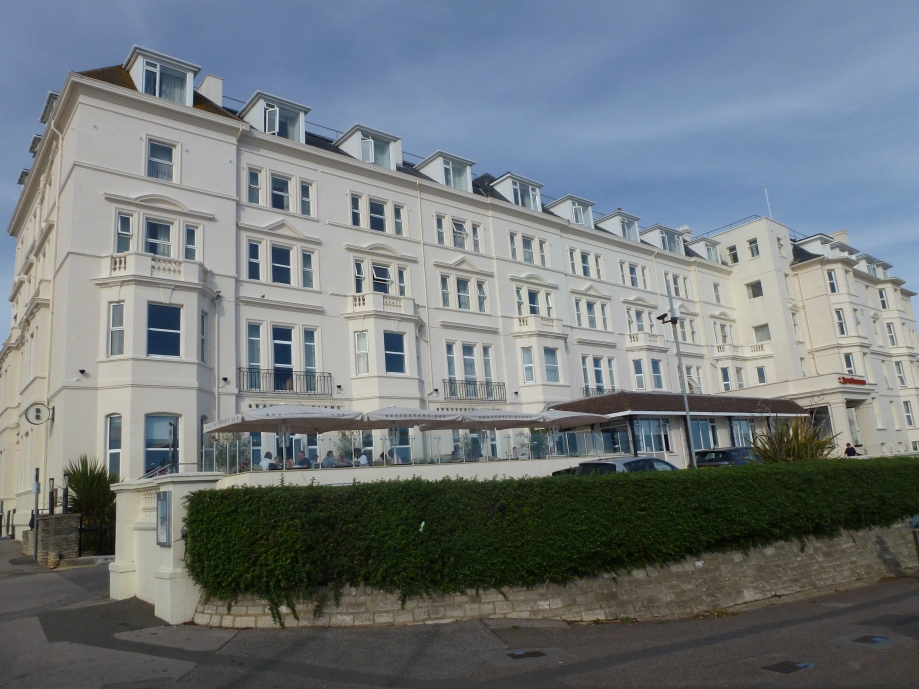
The Highcliffe Hotel where Colin and Andy Somers met Zoot Money for the first time while playing a jazz gig at the Blue Note Club (Photograph John Cherry)
When Zoot’s current band, The Sands Combo, imploded, he reformed one of his earlier groups, the Big Roll Band, with Colin, Andy Somers on guitar, Nick Newall on tenor sax and flute, plus occasional bassist Roger Bone. Zoot had already helmed two unsuccessful versions of the Rollers, but it was this line-up that would finally stick. They picked up dates at the Pavilion vacated by The Sands Combo and around the local area, including Southampton, where soon to be Shadow John Rostill sat in for an AWOL Roger Bone. However, Zoot was outgrowing Bournemouth and was keen to move to where the action was in London. At a date at Ossemsley Manor, sitting in with the Don Robb Band, Zoot was approached by Alexis Korner’s manager and invited to the capital on a short-term contract with Korner’s Blues Incorporated. Zoot jumped at the opportunity and left for the Big Smoke, with Andy Somers in tow for moral support. A couple of weeks later, the remaining Big Roll Band members were invited to join him for a gig at the Six Bells pub in Chelsea and a hastily arranged date at the Marquee Club. The time felt right for a permanent move and a flat was secured at 11 Gunterstone Road in West Kensington with money saved by Colin from his latest job at the government run, Signals Research and Development Establishment in Somerford. A couple of weeks later, Colin was more than happy to hand in his notice with SRDE and joined Andy in Nick Newall’s transit van on 1st January 1964 for the hundred mile trip into the unknown. He was twenty-six years old.
Their first job after settling into Gunterstone Road was to find a permanent bass player. Zoot had already caught Paul Williams at a Wes Minster Five gig performing more or less the same material as the Big Roll Band. Impressed by the quality of his voice, he invited Williams to join and mentioned that he was looking for a bass player. Paul answered that “He didn’t know anyone”, but Zoot, knowing that Williams could play rudimentary guitar, countered with, “How about you?”, then added, “You could learn, rehearsals start in two weeks”. Bass player sorted.
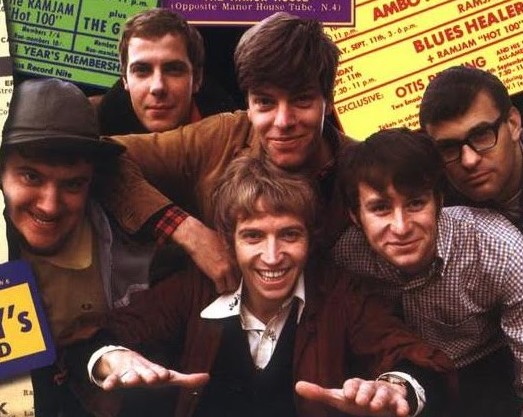
Zoot Money’s Big Roll Band circa 1966, Left to Right: Zoot Money, Paul Williams, Colin Allen, Johnny Almond, Nick Newall & Andy Somers in front (Photograph from the sleeve notes of Zoot! on Repertoire).
The band passed an audition for the Gunnell brothers, Rik and Johnny, at the Flamingo Club in Wardour Street and were an instant hit with the ‘Mingo’ crowd, as their brand of Ray Charles, James Brown, Jimmy Reed and Isley Brothers covers found favour with the Mod’s, West Indian immigrants and especially the black American G.I.’s who were reminded of home. Under the auspices of their manager, Bob Hind, the band branched out completing a grueling two-week residency at the Storyville Club in Frankfurt, Germany and travelling the A and B roads of Britain bringing their brand of R&B mayhem to ecstatic audiences across the land. An oft-cited statistic from the day has the BRB playing thirteen gigs in eight days, including afternoons, evenings and all-nighters, a relentless schedule in anybody’s book. As their popularity grew, Clive Burrows, another Wes Minster Five refugee, joined on baritone sax to give the brass more clout.
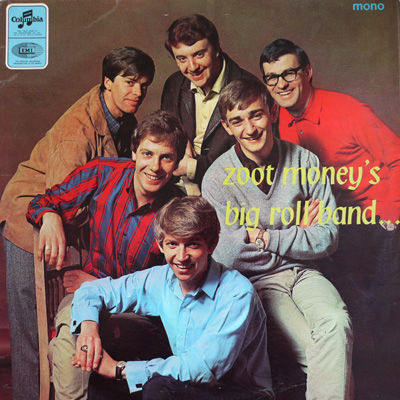

Their first single, a cover of The Daylighters “The Uncle Willie”, was a one-off deal for Decca, but by 1965 they were on Columbia, where over the next two years they released nine singles with “Big Time Operator” being the most successful peaking at number twenty-five in August 1966. Their debut album, It Should’ve Been Me, featured a road tested live set honed to perfection after months of non-stop gigging. Recorded in a day at Pye Studios with a lunch break at the local pub, the record displayed superb musicianship on a selection of twelve covers. For the follow up, Zoot!, they left the confines of the studio and decamped to Dick Jordan’s Klooks Kleek club above the Railway Hotel in West Hampstead. On the evening of recording, hundreds of people were turned away, but the lucky few who gained entry joined invited guests: Chas Chandler, Eric Burdon, Georgie Fame and Brian Auger for a night of high octane entertainment. Future Elton John producer Gus Dudgeon captured the Big Roll Band at the top of their game, by routing cables through the club windows from the Decca recording studio next door.
By 1967, the whiff of patchouli oil and hashish smoke was in the air and the wearing of beads, bells and kaftans became de rigueur with the rock glitterati as the Summer of Love filtered over the Atlantic ocean from Haight Ashbury in San Francisco. During 1966, Lysergic Acid Diethylamide (LSD) became the drug of choice amongst the people in the know and Zoot, with his buddy Eric Burdon, were at the forefront tripping away with the best of them and Colin and Andy weren’t averse to the odd foray into the realms of hallucinatory experience either. After such a mind-altering experience, the Big Roll Band’s days were numbered, as the main protagonists readied themselves for a radical detour into the world of sonic, lyrical and lysergic experimentation. To accommodate their new found direction, the band slimmed down to a quartet, much to the consternation of the brass section, and replaced bassist Paul Williams with Pat Donaldson.

Dantalian’s Chariot in their hippie finery, Left to Right: Pat Donaldson, Zoot Money, Colin Allen & Andy Somers (Photograph nostalgiacentral.com).
The newly christened Dantalian’s Chariot performed their debut gig on Saturday, 12th August, at the ‘Seventh National Jazz and Blues Festival’ in Windsor. An appearance at the ‘Festival of the Flower Children’ at Woburn Abbey two weeks later, where the band took to an all-white stage, wearing all white clothing and playing white instruments while bathed in what was believed to be the best light show in the country, confirmed their hippie credentials. The wild nights at the Flamingo became a distant memory, as the Chariot headed underground to the Middle Earth in Covent Garden and UFO at the Roundhouse in Chalk Farm, where they were highly regarded. However, outside of the capital they were looked on with suspicion and sometimes downright hostility, as most punters expecting a night of rowdy R&B, got a self-indulgent bunch of weirdos wittering on about “High Flying Birds” and “Fourpenny Bus Rides”. To put it mildly, they weren’t everybody’s cup of tea. To add salt to the wounds, Columbia didn’t approve of the new direction and dropped the band before an album could be completed. Instead, they were picked up by the Direction label on a one album deal which produced the schizophrenic Transition, a cobbled together collection of old Big Roll Band recordings and three Chariot tracks. The one positive to come from the experience was the excellent single, “The Madman Running Through the Fields”, a prime slice of trippy psychedelia drenched in studio trickery, including backward cymbals courtesy of Colin. A full Dantalian’s Chariot album didn’t emerge until 1995, when the specialist label Tenth Planet resurrected the tapes and released the ten track Chariot Rising.


Early in 1968, after another less than successful gig in Scarborough, Colin was behind the wheel of the band’s Zephyr Six driving home across the Yorkshire moors during a snowstorm with Andy, Pat Donaldson and their roadie Phil, when it skidded off the road and rolled down a slight incline before coming to a halt in a field. Colin and Phil crawled out of the wreckage relatively unscathed, Pat kicked out the back window to escape, but Andy, who was also in the back, ended up in Driffield Hospital with multiple bruising and a broken nose. The next day, the three walking wounded returned to London on the train after a night at the village police station, with Andy following later. The band played a few more gigs with Andy wearing plasters on his nose, but the writing was on the wall. Dropped by their record company, a couple of less than successful of shows in Sweden, a dwindling gig list and with costs mounting, the jokingly titled (by the band) Dandelion’s Charabanc rolled out of town for the last time on 19th April 1968 after a gig at the Mistralle Club in Beckenham.

Colin and Mick Taylor playing with John Mayall in 1968 (Photograph Colin Allen)
With Zoot ensconced in California living the high life as part of the New Animals with his drinking buddy Eric Burdon and Andy Summers soon to join him after a short sojourn with the Soft Machine, Colin was left in London to ponder his future alone. He picked up a couple of gigs depping for the indisposed drummer in Simon Dupree and the Big Sound and joined a Hollies tour playing with the Mike Vickers Orchestra backing Paul Jones and The Scaffold. Another option he pursued was the London production of the rock musical Hair. Conceived by Galt MacDermot and James Rado with music by Gerome Ragni, the controversial stage show told the story of a young man’s fight to avoid conscription into the Vietnam War whilst being torn in opposite directions by the newly emerging counterculture and his conservative parents. Colin auditioned and was accepted into the pit orchestra, but production was held up by the London stage censor, the Lord Chamberlain, because of its depiction of illegal drug use, nudity, and a liberal sprinkling of profanity.
As the case dragged through the judicial system, Colin undertook a two-week tour of Sweden with Georgie Fame, where he met his future wife, Marianne. Returning home, he landed a plum job with John Mayall, whose drummer, Jon Hiseman, had left to form the jazz / rock quintet Colosseum, taking bassist Tony Reeves and saxophonist Dick Heckstall-Smith with him. The blues man had been experimenting with a big band sound on his last album, Bare Wires, but wanted to return to basics with a guitar, bass and drums format. To accomplish this goal, he retained resident guitarist Mick Taylor, brought in the seventeen-year-old Stephen Thompson on bass and recruited Colin, who abandoned any thoughts of becoming a faceless musician in the West End. Hair eventually opened at the Shaftesbury Theatre on 27th September 1968 after a bill was passed through Parliament abolishing theatre censorship in the United Kingdom.


After completing a pre-arranged week’s residency with former Manfred Mann vocalist Paul Jones at the Fiesta Club in Stockton, Colin met up with his new bandmates for the first time at Decca Studios in West London on 26th August 1968 to record Mayall’s ninth album, Blues From Laurel Canyon. There was no time to run through the material, as Mayall liked spontaneity and chose his musicians accordingly, knowing they could be trusted to express themselves in the context of his music. The philosophy obviously worked, as the album was in the can within three days. The songs chart Mayall’s visit to California earlier in the year with titles such as “Walking on Sunset” about Sunset Boulevard, the main artery that cuts through central LA, and “Laurel Canyon Home”. The single “2401” relates to the number of Frank Zappa’s home on Laurel Canyon Boulevard while the flip side, “The Bear”, is about the portly singer in Canned Heat, Bob Hite. The experience made such an impact on Mayall that he became a resident of Californian a year later. Released in November, Blues From Laurel Canyon peaked at number thirty-three in the album charts and attracted mainly positive reviews.
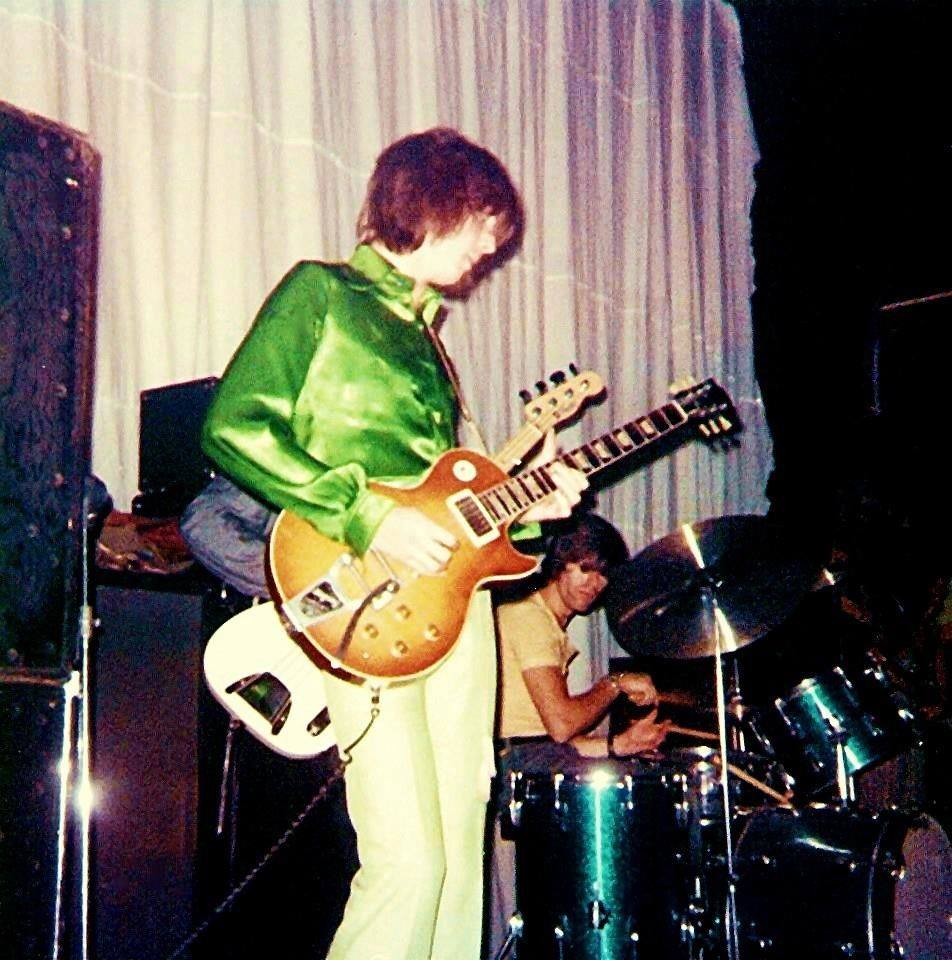
Eric Clapton joins the Bluesbreakers for a jam at the Grande Ballroom, Detroit on 12th October 1968 after a Cream gig across town at the Olympia Stadium (Photograph Colin Allen )
After a couple of warm up gigs in the UK, the band flew to Los Angeles for a two-month jaunt around the iconic ballrooms of America, taking in the Shrine Auditorium in LA, the Avalon and Winterland in San Francisco, the Kinetic Playground in Chicago, the Grande Ballroom in Detroit, the Tea Party in Boston and the Fillmore East in New York. The trek wound up in Florida, where they mimed self-consciously to “Walking on Sunset” on the Rick Shaw Saturday Hop TV show in Miami. Returning to the UK, it was back to reality with a bump on the less than salubrious club and college circuit before a prestigious concert at the Festival Hall in London with Aynsley Dunbar’s Retaliation, Champion Jack Dupree and Muddy Waters. To end the year, they undertook a trip to Scandinavia and for a final flourish, played the ‘Giant New Year’s Eve Gala Pop and Blues Party’ staged at the Alexandra Palace in Hornsey, North London with Joe Cocker and the Grease Band, the Bonzo Dog Band, Amen Corner and Gun. A tetchy performance by The Small Faces ended with Steve Marriott hurling his guitar to the floor and stomping off yelling “I quit”.
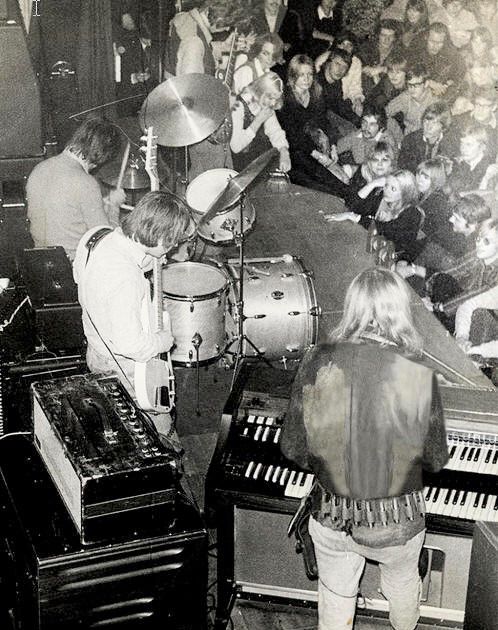
The Bluebreakers live in Sweden 1968 (Photograph Colin Allen)
1969 continued with a string of club dates and a radio session for Alexis Korner’s Rhythm & Blues Show, before they jetted off to Switzerland for an appearance on the TV show Pop Top and a run of dates in Zurich, Basel, Olten and Luzern. On their return, Mayall collapsed from physical exhaustion and influenza after a showcase concert at the Fairfield Hall in Croydon, triggering the cancellation of several gigs, including a hometown date for Colin at the Ritz, on 27th January. After a period of convalescing, the band resumed their itinerary by flying to Miami for a sixteen week tour of the USA, where at the end of April Mick Taylor handed in his notice. At the time, Mayall was considering a change of direction and took advantage of the situation by relieving Colin of his duties as well. The pair played their final show at the Musikhalle in Hamburg on the 23rd of May. By June, Taylor had replaced Brian Jones in The Rolling Stones and Mayall had reconfigured his band into an experimental acoustic unit by retaining Thompson on bass and adding finger style guitarist Jon Mark and the former Big Roll Band saxophonist Johnny Almond.
At a loose end, Colin visited the musicians in the production of Hair, where guitarist Alex Harvey put him in touch with his brother Les, who was on the lookout for a drummer for his band up in Glasgow. Lesley Harvey and Maggie Bell had originally been in the Kinning Park Ramblers together in the early sixties before going their separate ways. Maggie sang at the local Locarno Ballroom in a fifteen piece big band, then re-joined Les, plus former members of the Bobby Patrick Six in a covers band that toured American Airforce bases in Germany. In 1968 they returned home and formed Power with bassist James Dewar, who was originally in Lulu and The Luvvers, keyboard player John McGinnis and drummer Henry Wright from the soul outfit Sock ‘em JB. They became the house band at the best-known rock and blues club in Glasgow, the Burns Howff bar. During their residency, Les took two months off to tour America with local band, Cartoone, after their guitarist quit unexpectedly. He returned a changed man, with a new Fender Stratocaster guitar and a grand plan to revamp Power’s repertoire by writing original material. Unfortunately for Henry Wright, his employer sent him to London on a sales course for six weeks during the band’s overhaul and he lost his place to Colin, who drove up to Scotland in his pride and joy, a yellow Mini Cooper S, for a successful audition.





The band’s manager, Mark London, entered a co-management deal with Led Zeppelin’s Peter Grant, who exclaimed “Stone the Crows” on hearing Maggie’s voice. They signed with Polydor and recorded their debut, Stone the Crows, at Advision Studios with Mark London producing. Comprising of three original songs, the seventeen minute “I Saw America” with lyrics by Colin relating his travels in the USA with Mayall, “The Touch of Your Loving Hand”, a showcase for Maggie and Jim Dewar to air their vocal prowess and “Raining in Your Heart”, an up tempo rocker highlighting Les Harvey’s guitar. The remaining tracks consisted of a re-tooled version of The Beatles “The Fool on the Hill” and an acoustic take on Josh White’s “Blind Man”. The critics were mainly enthusiastic, with Disc & Music Echo stating, “This proves that they’re one of the most exciting bands we’ve produced for a long time. It’s a tremendously compact sound, oozing the talents of Les Harvey’s writing and Maggie Bell’s female Joe Cocker voice. Stone the Crows are going to be huge”. Unfortunately, sales weren’t huge, but the omens were good as their label funded a follow up.
The Crows took to the road like ducks to water, playing six nights a week in universities, colleges and clubs, including the Ritz in Bournemouth on 18th October. They ended 1969 on a theatre tour with Ten Years After and Blodwyn Pig. In March 1970 the band headed off to America where they shared stages with the Grateful Dead, the jazz trumpeter Miles Davis (who complimented Maggie’s singing style), the MC5, Iggy Pop and the Stooges, Leslie West’s Mountain, Three Dog Night and in New York, Detroit and selected other cities, Joe Cocker and the Mad Dogs and Englishmen. During their time opening for Cocker, Colin befriended their drummer Jim Keltner who would hang out with him on his regular visits to London, where Colin would ferry him around town in his Mini and lend him his kit for sessions, the most famous being for the John Lennon Imagine album.

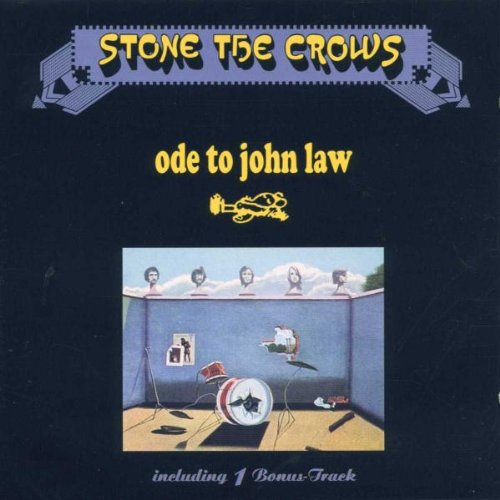
Ode to John Law, released nine months after their debut, featured six originals and one cover, Percy Mayfield’s “Danger Zone”, which became a staple in their live shows. Other highlights included the catchy “Love 74” and “Sad Mary”, both showcases for Harvey’s fret board wizardry. Colin contributed lyrics to two songs, the title track which was inspired by the Kent State University shootings of four students by the Ohio National Guard. The John Law of the title refers to the cops who routinely used rough house tactics on long-haired hippie types and “Mad Dogs and Englishmen”, which documented their time supporting Joe Cocker. The reviews were mainly good as before. Disc & Music Echo commented, “The long awaited follow up to their much praised debut. There’s certainly plenty of variety and originality from the highly freaky and not altogether successful title track to the beautiful, slow and atmospheric “Things are Getting Better” which features Maggie Bell at her very best”. Perhaps not quite as enthusiastic as the review of their debut, but still positive.
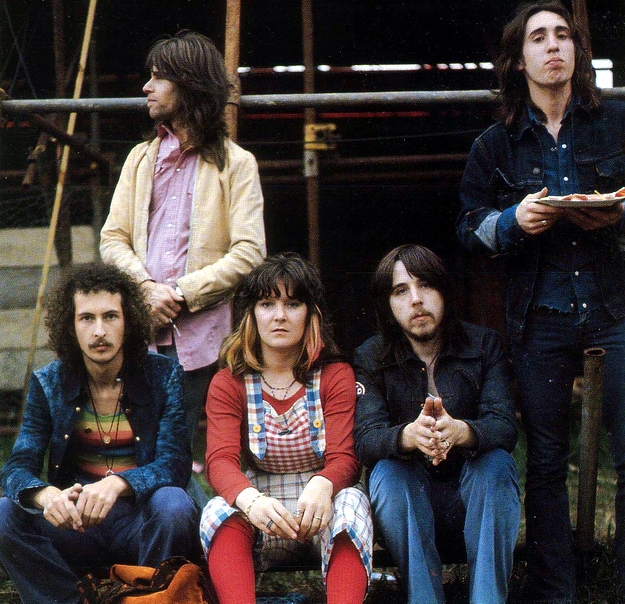
Stone the Crows, Left to Right: Colin Allen and Steve Thompson standing, Ronnie Leahy, Maggie Bell and Les Harvey sitting (Photograph unknown).
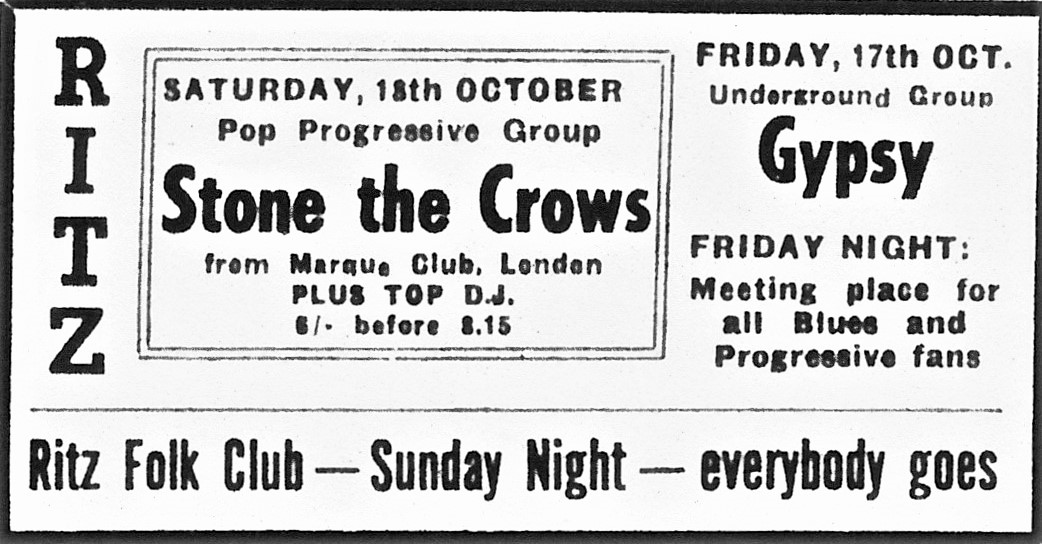

In 1971, McGinnis and Dewar left to be replaced by keyboard player Ronnie Leahy and Colin’s old partner from John Mayall, bassist Steve Thompson. McGinnis faded into obscurity and became a teacher, while Dewar found considerable success with Robin Trower in the mid-seventies. The revamped line-up recorded Teenage Licks, a powerhouse rock album with standout tracks such as “Big Jim Salter”, “Mr Wizard”, their euphemism for a joint, a cover of Dylan’s “Don’t Think Twice Its Alright” and the punchy “I May Be Right, I May Be Wrong”. “Keep on Rolling”, “Faces”, “One Five Eight”, “Seven Lakes” and a short snippet of the traditional “Aileen Mochree” on which Maggie sings unaccompanied and in Gaelic completed the track listing. Melody Maker was gushing in their praise, “Without doubt, the best they have put out so far. It’s a funky batch of bitchy items that forms a pure gas of an album, with some of the most vicious Maggie Bell I’ve heard”. The record boosted their profile in the UK, enabling them to join the lucrative festival circuit, including a shindig held at Weeley, near Clacton. The festival was an ambitious affair, probably over ambitious, organised by the good people of the Clacton Round Table to raise money for charity instead of the usual Donkey Derby. Held over the August bank holiday weekend, an estimated crowd of over one hundred thousand people plus a chapter of cantankerous Hells Angels turned up to see Stone The Crows play on the Friday along with Bournemouth troubadour, Al Stewart, Colosseum, Barclay James Harvest and Robert Fripp’s King Crimson.
Things looked as if they were on the up for Stone the Crows. Maggie won ‘Best Female Vocalist’ in the annual Melody Maker poll and they became regulars on television screens across Europe appearing on the BBC’s Old Grey Whistle Test, Granada’s Doing Their Thing, Germany’s Beat Club and Beat Workshop plus POP 2 in France. It felt as if stardom was just around the corner, but fate held a tragic twist in the tail. On 3rd May 1972, at the Swansea Top Rank, a technical fault had delayed the start of the concert. As the band were about to launch into their opening number, Les Harvey grabbed a badly grounded microphone while holding his guitar and received a massive electric shock in front of a thousand of fans. Colin was the first to react and ran over to kick the guitar out of his hand but it was too late. Les died immediately while Maggie, his fiancé, watched from the wings. Everyone in the band was devastated. He was twenty-seven years old.

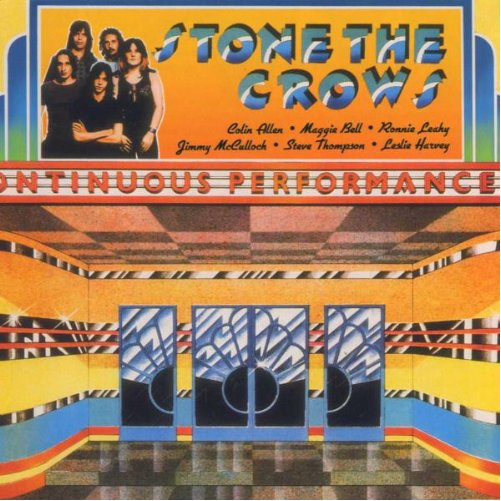
Understandably shaken, the band vowed to continue with the enigmatic Peter Green set to replace Les. Six weeks of rehearsals got underway at Ronnie Leahy’s house, but Peter was a troubled man. Since leaving Fleetwood Mac he had been suffering from depression, had given large amounts of his money away and was in the early stages of onset schizophrenia. Sensing that his new band could become just as successful as his previous band, Peter got cold feet two days before his debut at the ‘Great Western Express Festival’ in Lincoln on 27th May and pulled out. Steve Howe of Yes volunteered to stand in at the last minute, and after receiving a tape the day before, learnt the Crows set overnight. Under the circumstances, he did a sterling job with reports on the day congratulating the band for their performance, especially Maggie, who poured her grief into her impassioned vocals. The Faces had the unenviable task of following them and struggled to top their performance.
After the gig, Howe returned to Yes, and the twenty-year-old Jimmy McCulloch was brought in from Thunderclap Newman to help finish their fourth album, Ontinuous Performance. Another solid addition to their canon, it featured the driving slide guitar tour de force of Sonny Terry and Brownie Magee’s “Penicillin Blues” and the nine minute plus opus “Niagra”. McCulloch added his guitar to the driving “Good Time Girl” and “Sunset Cowboy”, a heartfelt ballad with lyrics by Colin dedicated to Lesley. Considering the circumstances under which the record was conceived, the consensus at the time was very positive, and most reviewers agreed it was a fitting epitaph to the tragic guitarist. McCulloch made his live debut at Birmingham University on 23rd June at the start of a UK tour that visited Colin’s hometown on 30th July, calling in at the Chelsea Village in Glen Fern Road.
Harvey’s untimely death was a terrible blow that the band never fully overcame. He was their guiding force, and his absence hung over them like a black cloud. Without him, the heart and soul was ripped from the band and they called it a day on 28th April 1973 after a gig with Roxy Music and Focus at the ‘Montreux Golden Rose Festival’ in Switzerland. Jimmy McCulloch joined Paul McCartney’s Wings and Ronnie Leahy worked with Donovan, Jack Bruce and Nazareth. Maggie Bell pursued a solo career under the guidance of Peter Grant, a move that Colin believes was inevitable as the management always regarded Maggie as the star of the show. As for Colin he picked up the odd bit of session work guesting on singer songwriter Billy Lawrie’s Ship Imagination, Brian Friel’s self-titled album, former Moody Blues and Wings guitarist Denny Laine’s Ahh! Laine and with Zoot on Ellis’s Why Not.
Towards the end of 1973, Colin took a call from the producer Mike Vernon, who informed him he had been hired to oversee the next album by the Dutch progressive rock band Focus. He had already been at the helm of their breakthrough album, Moving Waves, and remembered Colin from his Mayall days when he worked with him on Blues from Laurel Canyon. Apparently, the Focus drummer, Pierre van der Linden, had walked out, fed up with the relentless touring and unchanging set lists. First choices, Mitch Mitchell and Aynsley Dunbar were otherwise engaged, but Colin accepted the challenge and left for Holland with immediate effect to meet vocalist / organist / flautist Thijs van Leer, guitarist Jan Akkerman and bassist Burt Reiter. An intense learning curve awaited him, as his knowledge of the Focus back catalogue was vague to say the least and a far cry from the rock and blues Colin was used to. Focus mined an European neoclassical style that shunned blues scales and the American / British rock tradition, but with help from Jan to familiarise himself with the material, he was ready to for his debut at the Maple Leaf Gardens in Toronto on 19th October.
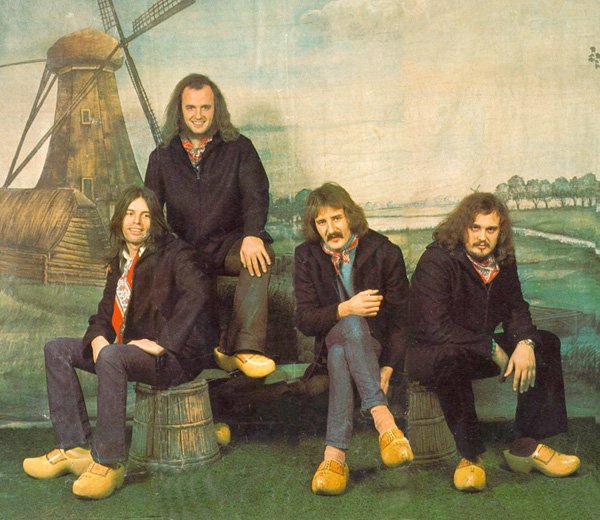
Clogs and a windmill, are they Dutch by any chance? Focus in 1974, Left to Right: Colin Allen, Thijs Van Leer, Jan Akkerman & Bert Reiter (Photograph unknown).
At the beginning of 1974, Focus entered Olympic Studios in Barnes, London to record their fourth album, Hamburger Concerto. The band was already riding high on the success of two top twenty singles and three hit albums, two of which entered the UK top ten with one, Moving Waves, just failing to hit the top spot. But unbeknownst to Colin, ongoing antagonisms between Thijs van Leer and Jan Akkerman had been brewing for some time, and the atmosphere at the sessions was fractious. Reviews split the critics down the middle, but the fans lapped it up. There is much to enjoy on the album such as the short flute / lute instrumental “Delitae Musicae”, the boogie of the single, “Harem Scarem”, a title suggested by Colin as it was similar to an earlier hit of theirs, “Hocus Pocus” and the flute, harpsichord and guitar interplay of “Birth”, which creates a juxtaposition of styles, or “Baroque ‘n’ Roll’ as they liked to call it. The tour de force is the “Hamburger Concerto” suite itself, twenty minutes of rocking riffs, scatty falsetto vocals, churchy organ, breathy flute and dazzling guitar passages, courtesy of Akkerman.
The band took the album out on the road at the end of March, kicking off in Europe at the Tivoli in Copenhagen. They then flew into London to tape an In Concert programme for the BBC, before a gig at the Rainbow Theatre in Finsbury Park was filmed for the American TV show Dick Clark’s in Concert. A series of dates in Japan and Australia followed, then back to Europe where they fulfilled festival engagements in Bilzen, Belgium and a soggy Sunday at the ’14th National Jazz, Blues and Rock Festival’ in Reading with Barclay James Harvest, Chapman and Whitney’s Streetwalkers and Chilli Willi. The year ended in Europe, where they played their final show of the year in Voorburg, Holland.

Colin in Focus (Photograph Colin Allen)
The new year carried on where the old one left off, back on the road in the UK and Australia. In Japan, they were treated like The Beatles, with crowds of kids waiting for them at the airport holding banners and screaming, before the band was whisked away for a press reception. It was the nearest Colin came to being a bona fide pop star. After Japan, the band moved on to Australia, Europe and the US. In early 1975, they played three gigs in Spain and as Colin soaked up the atmosphere in Bilbao, he was unaware that it would be his last show with the Dutch progsters. Back in a studio in Belgium, an incident occurred where Akkerman threw a drum machine onto the sofa where Colin was sitting after he had the temerity of trying out a click track (a device that helps a drummer keep time). The next day he was unceremoniously fired with no explanation given. There were mutterings of problems with the language barrier and that Jan wanted Pierre van der Linden back in the fold, but Colin never found out the real reason for his dismissal.
The jet-set style life style Colin had become accustomed to came to an abrupt end, and he found himself back in London with a debt of eleven grand incurred during his short tenure with Focus. The sum remains a mystery to Colin to this day and curtailed the payment of any royalties for several years. Although he enjoyed his time with the band and doesn’t regret his decision, by doing so he gave up the chance to join former Crows bassist Jim Dewar in Robin Trower’s band. In hindsight, it might have been the better option as Trower became a major selling artist throughout the late seventies and Colin could have made money from his song-writing abilities.


An invitation from another Crows old boy Ronnie Leahy rescued him from the dole queue, when he took a job with the Scottish troubadour Donovan. By the late seventies, the folk singer’s best years were behind him as his hippie ideals and whimsical song writing were at odds with the punk ethos. Nevertheless, he was still an active recording artist and for his next album, simply entitled Donovan; he returned to Mickie Most, the producer who masterminded his best work back in the sixties. The band of Colin, Ronnie, bassist Nick South and guitarist Miller Anderson took the album of inconsequential soft rock ditties out on the road for six months supporting Yes, who shared the same management team. As the tour ground to a halt, the hostile environment in his homeland prompted the singer / songwriter to move his base of operations and band to Los Angeles. However, over time, the stress of housing and feeding four musicians became too much of a financial burden and he reluctantly let them go.
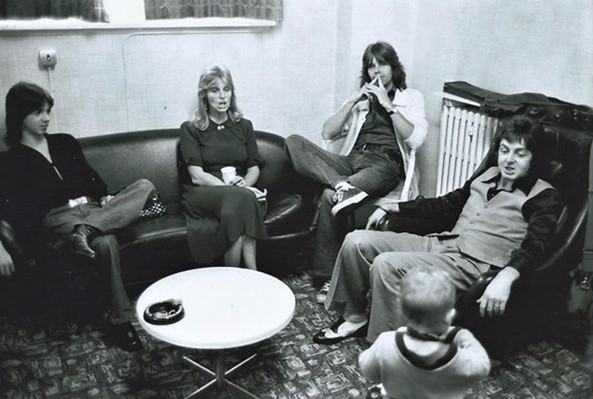
Backstage at a Wings concert in the mid-seventies, Left to Right: Jimmy McCulloch, Linda McCartney, Colin Allen and Paul McCartney (Photograph Colin Allen)
Colin, Miller and Ronnie stayed in the States and formed The Dukes, with former Crows guitarist Jimmy McCulloch, who had been in Paul McCartney’s Wings for three years and the New Zealand born bassist Charles Tumahai late of Bill Nelson’s Be-Bop Deluxe. While McCulloch was with McCartney, he and Colin collaborated on two songs, “Medicine Jar” and “Wino Junko”, which appeared on Venus and Mars and Wings at the Speed of Sound, respectively. Royalties collected by Colin helped finance the band members while talks of a deal with the Doobie Brothers manager, Bruce Cohen, were in progress. As the negotiations dragged on, UK currency restrictions caught up with him, which prevented the cash flow from reaching the US. Disappointed and broke, the band returned home. Eventually the deal came to fruition, and The Dukes entered Rockpile Studios in Wales to record an album. After a couple of days, Colin was unceremoniously kicked off the project and informed by Anderson that he could still be in the band for gigs but, they would use a different drummer for recording. Not unsurprisingly, he told them all to get lost, or words to that effect. After providing financial support, he rightly felt aggrieved at the way he had been treated and walked away. The self-titled album eventually came out in 1979 and went straight to the bargain bins. The Dukes folded after McCulloch’s death from a cardiac arrest brought on by drink and drug problems.

John Mayall’s Bluesbreakerss in 1982, Left to Right: Colin Allen, John McVie, John Mayall & Mick Taylor (Photograph Colin Allen)
Colin had enjoyed his stay in LA and moved back to the sunshine state to test the waters, a ploy which paid off with an invitation to appear on Rod Stewart’s Foolish Behaviour, sharing the drum stool with Carmine Appice and Roger Bethelmy. Rod intimated that if, or when, Carmine left his touring band, Colin would be the first person he would call. When the position eventually came up, Rod went with the former Spontaneous Combustion drummer Tony Brock, who hailed from Oakdale in Poole, instead.
In 1982, John Mayall reformed the Bluesbreakers with past members Mick Taylor, bassist John McVie, who was enjoying down time from Fleetwood Mac and Colin. A run of shows in Australia, Hawaii and mainland USA culminated in a concert at New Jersey’s Capitol Theatre with blues royalty Albert King, Etta James, Sippie Wallace, Buddy Guy and Junior Wells. The show was filmed for a video release, Jamin’ With the Blues Greats. As the gigs progressed, Steve Thompson replaced McVie but in the summer of 1983, Mayall broke the band up after a tour of Europe. A live recording from a concert at the Wax Museum, Washington DC, in June 1982 was belatedly released on the CD, The 1982 Reunion Concert.


Bob Dylan has always been a chameleon like character, one minute a folksy voice of a generation, the next an amphetamine fueled rocker wielding an electric guitar. In the late sixties he became a crooning country singer and by the late seventies an evangelising born again Christian. In 1983, he changed tack once again and co-produced Infidels with the Dire Straits guitarist Mark Knopfler. Viewed by critics and fans alike as a partial return to form, the collection of eight secular songs left behind the religious dogma of his previous three albums and tackled love and loss, greed and power, in fact, typical Dylan themes. In March 1984 Bob made an entertaining, if slightly shambolic, appearance on Late Night with Letterman with the Latino punk band The Plugz, his preferred choice for a new touring band. However, promoter Bill Graham had other ideas, as he was planning a money spinning greatest hits tour of European stadiums with support band Santana, and a rough-and-ready bar band backing up his prized asset was not what he had in mind. Graham applied pressure on Dylan to pull a suitable band together and, recalling the Infidels sessions, Bob drafted in the guitarist he had used, Mick Taylor, as musical director. Taylor filled the requisite positions with the former Faces keyboardist Ian McLagan on Hammond after noted session pianist Nicky Hopkins failed to get to grips with the preferred organ and Benmont Tench of Tom Petty and the Heartbreakers was unavailable. The only American member of the band, Greg Sutton, was recruited on bass and Mick’s old friend from past line-ups of the Bluesbreakers, Colin, came in on drums. The initial rehearsals took place at Dylan’s house, Point Dume in Malibu, before moving on to the Beverly Theatre in Los Angeles.

Left to Right: Bob Dylan, Colin Allen, Greg Sutton, Ian McLagan & Mick Taylor (Photograph dylanlive.substack.com).
After a shaky opening few shows in Italy and Germany, they progressed through Holland where Joan Baez fleetingly joined the bill, but soon disappeared in a huff after old animosities between the two reared its head. The tour picked up steam through Switzerland, Denmark, Austria, Spain and France, and by the time they reached England in early July, the band was firing on all cylinders with Dylan performing at the height of his powers. At Wembley Stadium, Eric Clapton, Carlos Santana and Chrissie Hynde augmented the band for the last seven songs and Van Morrison joined Bob on a soulful “It’s All Over Now Baby Blue” to the delight of the seventy-two thousand adoring fans. At the final show at Slane Castle in Ireland, Van reappeared with Bono from U2.

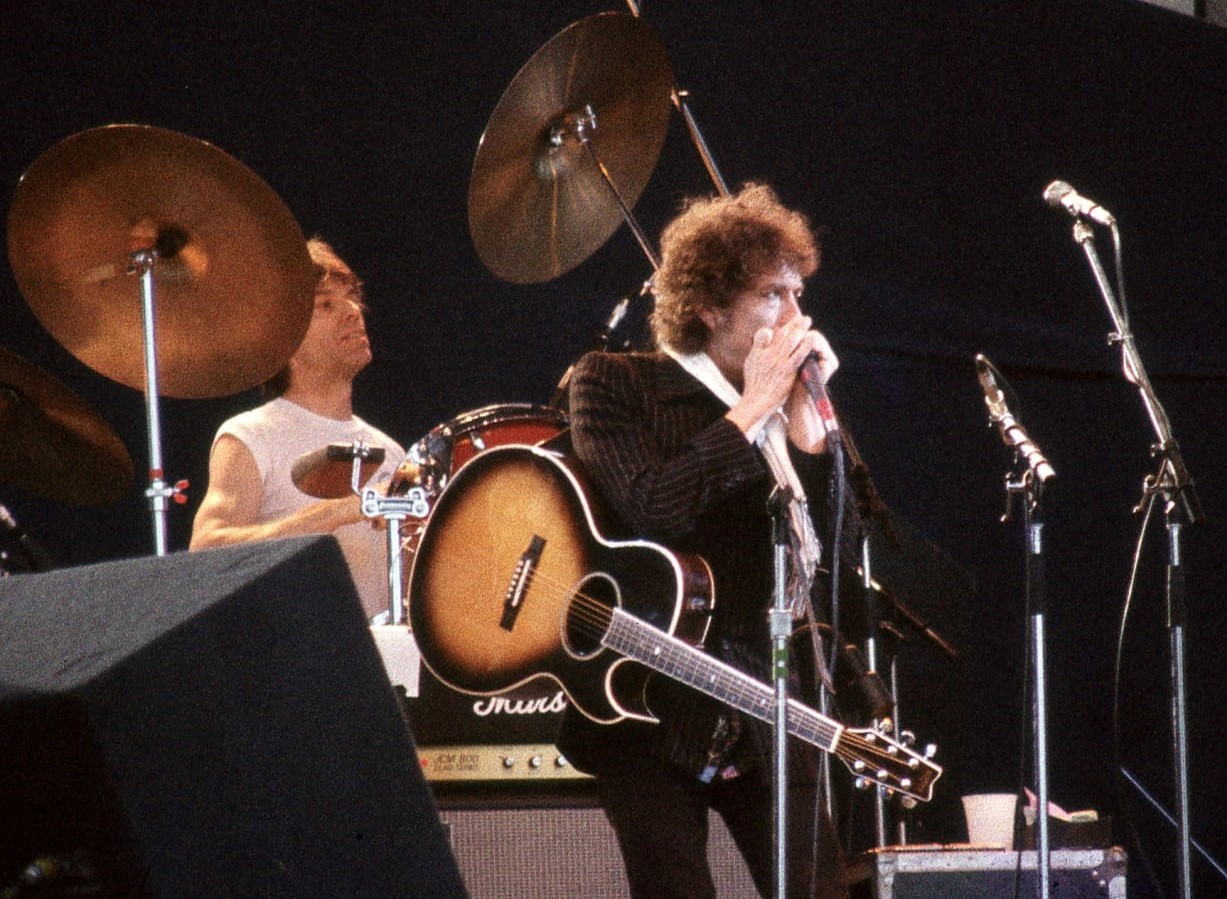

Left: Colin and Bob. Right: Colin, Bob & Mick Taylor, Offenbach, Germany June 1984 (Photographs Norbert Kohlhauer).
An album, Real Live, recorded in London and Newcastle came out to a muted response and even derision from some quarters, not that it bothered Colin, as he enjoyed the experience of playing with a living legend, even if it was tricky finding the beat on occasions, or even knowing which song Bob had just launched into. He was also glad that his elderly mother saw her son perform at Wembley with some of the biggest names in the business while ensconced in the Royal Box. She must have been very proud, if somewhat bemused. The legacy of working with an icon lived on into 2016 when Colin received a call from his local paper in Stockholm, Aftonbladet, and was asked to comment on his old boss receiving the ‘Nobel Prize for Literature’. He was happy to oblige with a couple of anecdotes and a mugshot taken outside his apartment building.

Colin photographed in 2016 close to his home in Stockholm for the newspaper Aftonladet
The expected follow on work from the Dylan tour failed to materialise, apart from a low key trawl around half a dozen clubs in America with Mick Taylor, giving Colin a chance to re-evaluate his priorities. He had a young daughter and a soon to be wife in Stockholm, so it was inevitable he would end up living there. As he slowly integrated into the Scandinavian way of life, he picked up a few odd jobs performing with local bands, including the popular Totta’s Blues Band with whom he recorded the album, Totta & Hot N’ Tots featuring Spencer Bohren. Over time, the gigs gradually dried up, and he withdrew from playing music for eight years until a phone call from Zoot Money in 2003 brought him out of retirement. A thirty-six date jaunt around the UK backing Long John Baldry, Paul Williams and Ray Dorset of Mungo Jerry fame in ‘The British Legends of R&B Tour’ had been booked, and Zoot naturally thought of Colin as the drummer. He had a lot of fun and concluded that he missed the buzz of a live gig and that it wasn’t such a big deal to fly over from Stockholm for a couple of week’s work. Although there was a downside, he would have to sleep on the lumpy sofa at the ‘Rannoch Hilton’, Zoot’s home in Hammersmith.


Formed in 2004, by pianist Bob Hall from a floating roster of musicians who made their names during the blues boom of the sixties, The British Blues All-Stars were built on a nucleus of Colin, Bob Hall, bassist Colin Hodgkinson and former Manfred Mann guitarist Tom McGuinness. Depending on who was available, Kim Simmonds, Dave Kelly, Long John Baldry, Peter Green, Miller Anderson, Otis Grand, Snowy White or Maggie Bell fleshed out the line-up. Out of the All-Stars evolved The British Blues Quintet, an amalgamation of old hands: Colin, Zoot, Maggie, Miller Anderson, and Colin Hodgkinson. The quintet played regularly in blues clubs, small theatres and festivals throughout Europe until 2011, when the band undertook their final tour in the spring augmented by guitarist Dave Kelly. A CD, Live in Glasgow, was released in 2008. Colin performed in public for the final time in June 2014 at the Bluebirds Social Club in Longham, as part of the Eggroll Band’s charity gig to raise money for a blue plaque to put over the door of the old Le Disque A Go! Go!. He shared drum duties with Chris ‘Fergie’ Ferguson of the Nite People.


Colin’s last gig with The Egg Roll Band at Bluebirds Club, Longham 2014. Left to Right: Zoot Money, Paul MacCallum, Howie Casey, Colin Allen, Al Kirtley & Ed Roberts (Photograph John Cherry)
As well as being a respected tub thumper, Colin’s ability to knock out a lyric or two shouldn’t be overlooked. Apart from the compositions he contributed to Stone the Crows and the two he co-wrote with Jimmy McCulloch during his tenure with Wings, several of his songs have been recorded by other artists. The Scottish songstress Lulu recorded “Heaven and Earth and the Stars”, a joint composition with Zoot. Colin and Christine McVie co-wrote “Wish You Were Here” for Fleetwood Mac’s 1982 album Mirage and Mick Ronson included Colin’s “Don’t Look Down” on his 1994 solo record, Heaven and Hull. Long John Baldry, Jon Lord, Novostar and Maggie Bell have all recorded Money / Allen compositions over the years.

Colin’s autobiography: From Bournemouth to Beverly Hills: “Tales of a Tub Thumper”.
Colin is now happily retired in Stockholm with his wife Marianne and their daughter Mia and is still close friends with many of his old bandmates from the past. Now in his eighties, he reflects on a life spent on the road, meeting interesting people, travelling to exotic locations and most of all having fun and playing music while paying the bills. He ruminates on missed opportunities in the past to provide for his retirement as he hasn’t, as he likes to say, “got a pot to piss in”, but there again, he wouldn’t have had it any other way. For a detailed warts and all look at his life read his highly recommended autobiography From Bournemouth to Beverly Hills “Tales of a Tub Thumper” available from Amazon.
Special thanks go to Colin Allen for emails, Skype chats and photographs.
Colin Allen Discography
Zoot Money’s Big Roll Band Singles
The Uncle Willie c/w Zoot’s Suite: Decca (F11954) 1964
Gin House c/w Rockin’ Chair: Columbia (DB 7421) 1964 Paul Williams and the Big Roll Band
Good c/w Bring it on Home to Me: Columbia (DB 7518) 1965
Please Stay c/w You Know You’ll Cry: Columbia (DB 7600) 1965
Something is Worrying Me c/w Stubborn Kind of Fellow: Columbia (DB 7697) 1965
The Many Faces of Love c/w Jump Back: Columbia (DB 7768) 1965 Paul Williams and the Big Roll Band
Big Time Operator c/w Zoot’s Sermon: Columbia (DB 7975) 1966
Let’s Run For Cover c/w Self Discipline: Columbia (DB 7876) 1966
Star of the Show (The La La Song) c/w The Mound Moves: Columbia (DB 8090) 1966
Knick Knack c/w I Really Learnt How to Cry: Columbia (DB 8172) 1967
Zoot Money’s Big Roll Band EP’s
Knick Knack: Columbia (ESRF 1874) 1964
Big Time Operator: Columbia (SEG 8519) 1966
All Night Worker: 1960’s Records (REP 20) 2018 Although released on Record Store Day, this is an unofficial rip-off, avoid!
Zoot Money’s Big Roll Band Albums
It Should’ve Been Me: Columbia (33SX 1734) 1965
Zoot! Live at Klooks Kleek: Columbia (SCX 675) 1966
Transition: CBS Direction (8-63231) 1968
Were You There? Live 1966: Indigo (IGOXCD 518) 1999
Fully Clothed and Naked: Indigo (IGOCD 529) 2000 Live Big Roll Band recordings and solo Zoot Money
A’s & B’s Scrap Book Repertoire (REP 4796) 2003 Compilation
A Big Time Operator: Castle (CMDDD 1219) 2005 Double CD compilation
The Best of Zoot Money’s Big Roll Band: Repertoire (REP 5027) 2007 Compilation
Big Time Operator: The Singles 1964-66: Wah Wah Records (LPS143) 2014 Compilation
1966 and All That / Big Time Operator: Repertoire (REP 5343) 2018 Limited Edition 4 CD Box Set
Dantalian’s Chariot Single
The Madman Running Through the Fields c/w The Sun Came Bursting Through My Cloud: Columbia (DB 8260) 1967
Dantalian’s Chariot Albums
Chariot Rising: Tenth Planet (TP 015) 1995 Limited Edition vinyl of 1,000 copies
Chariot Rising: Wooden Hill (WHCD005) 1996 CD
Chariot Rising: Wah Wah Records (LPS113) 2013 Vinyl
Chariot Rising: Esoteric (ECLEC 2609) 2017 Remastered CD
John Mayall Single
2401 c/w The Bear: Decca (F 12846) 1968
John Mayall Albums
Blues From Laurel Canyon: Decca (LK 4972) 1968
The 1982 Reunion Concert: Repertoire (4393 WY) 1994 Live
Stone the Crows Singles
Mad Dogs and Englishmen c/w Sad Mary: Polydor (2066 060) 1970
Good Time Girl c/w On the Highway: Polydor (2058 301) 1972
Stone the Crows Albums
Stone the Crows: Polydor (2425-017) 1970
Ode to John Law: Polydor (2425-042) 1970
Teenage Licks: Polydor (2425-071) 1971
Ontinuous Performance: Polydor (2391-043) 1972
Stone the Crows Featuring Maggie Bell: Polydor (PD 6017) 1973 Best of compilation
Stone the Crows: Polydor (2482 279) 1976 Best of compilation
The Very Best of Maggie and Stone the Crows: Global Television (RADCD145) 1999 Compilation CD
BBC Radio 1 Live in Concert: Strange Fruit (SFRSCD049) 1998
The BBC Sessions Volume 1 1969 – 1970: Strange Fruit (SFRSCD054) 1998
The BBC Sessions Volume 2 1971 – 1972: Strange Fruit (SFRSCD068) 1998
Live in Montreux: Angel Air (SJPCD116) CD 2002
Live Crows 1972 – 1973: Angel Air (SJPCD272) CD 2008
Radio Sessions 1969 – 1972: Angel Air (SJPCD299) CD 2009
Stone the Crows / Ode to John Law: Angel Air (SJPCD463) 2015 Two for one CD with four live bonus tracks
Teenage Licks / Ontinuous Performance: Angel Air (SJPCD468) 2015 Two for one CD with four live bonus tracks
Stone the Crows: Repertoire (REPUK1392) 2021 Remastered with 12 page booklet
Ode to John Law: Repertoire ( REPUK1397) 2021 Remastered with 12 page booklet and one bonus track
Teenage Licks: Repertoire ( REPUK1395) 2021 Remastered with 12 page booklet
Ontinuous Performance: Repertoire (2 REPUK1396) 2021 Remastered with 12 page booklet
Live at The BBC: Repertoire (2 REPUK1413) 2021 Remastered four CD Box Set. Radio sessions and live concerts from 1969 to 1972
Focus Single
Harem Scarem c/w Early Birth: Polydor (2058 466) 1974
Focus Albums
Hamburger Concerto: Polydor (2442124) 1974
Mother Focus: Polydor (3100 265) 1975 One track only
Donovan Album
Donovan: RAK (SRAK 528) 1977
Bob Dylan Albums
Real Live: CBS (26334) 1984
Slane Castle: The Irish Broadcast 1984: X-Ray (XRY2CD037) 2023 Unofficial release
The British Blues Quintet Album
BBQ Live in Glasgow: Angel Air (SJPCD203) 2008
Colin Allen Albums As a Guest
Top Topham Ascension Heights: Blue Horizon (7-63857) 1970
Brian Auger & the Trinity Befour: RCA (SF 8101) 1970
Chris Barber Drat That Fratle Rat!: Black Lion Records (2460-208 ) 1972
Tennent – Morrison Tennent – Morrison: Polydor (2383 152) 1972
Ellis Why Not: Epic (SEPC 65650) 1973
Denny Laine Ah…Laine: Wizard (WZ 2001) 1973
Billy Lawrie Ship Imagination: RCA Victor (SF 8395) 1973
Brian Joseph Friel Brian Joseph Freil: Dawn (DNLS 3054) 1973
Denny Laine Ahh! Laine: Wizard (SWZ 2001) 1973
Sirkel & Co Sirkel & Co: Affinity (AFF1) 1977
Rod Stewart Foolish Behaviour: Riva (RVLP 11) 1980
Robbie Patton Distant Shores: Liberty (LT 1107) 1981
Totta & Hot N’Tots Totta & Hot N’Tots featuring Spencer Bohren: Public Road Records (PR 989) 1989
Having written a book of my memoirs, spanning some eighty years, I’m very aware of the amount of time and patience that’s required to complete such a venture, as the BOURNEMOUTH BEAT BOOM – an archive in many ways, of events and situations that affected so many local, fledgling musicians during an historic period of about 10 years.
For most of the guys mentioned, I suppose the important “eureka” moments took place sometime between 1958 and 1968 and before long, many were on the road to fame and fortune – those that weren’t probably had a lot of fun. Some continued playing as semi-pro performers, while others got involved in the music business, in a variety of other ways.
A lot of years and a lot of guys, whose varied histories took much time and passion to research and compile, countless details of so many musical careers and recorded in such a readable way. An impressive undertaking by any standards and it’s with that thought in mind, that I commend fellow Bournemouth boy – John Cherry, on a job well done.
Colin Allen
LikeLike
It is lovely to hear about your life,you proberbly won’t remember me but we used to dance together on the jazz nights at the YMCA in west over road in Bournemouth on a Wednesday night in the 60s, my name was Rita and I used to come with my friend Jill Baxter.
I often wondered what happened to you now I know xx
LikeLike
Hi Rita, I passed your email address onto Colin, so you might get a reply. John
LikeLike
A very appreciated percussionist and underrated participant within the realm of recordings and stage performances. My delight is to incorporate the stylized arrangements from Colin Allen’s repertoire, particularly that of ‘Hamburger Concerto’, within a stage theatre concept entitled ‘Renaissance’, as is based predominantly on performances of the Bournemouth Symphony Orchestra.
LikeLike
Thanks Paul, I am sure Colin would appreciate your comments. John
LikeLike
Always enjoyed your work with John Mayall, and you’ve filled me on on part of Steve Thompson’s subsequent career – I loved his bass playing. Is he still around?
Thank you for the music, to coin a phrase.
LikeLike
Thanks for taking the time to respond Laban. Unfortunately, I believe Steve Thompson died back in 2007, a sad loss. John
LikeLike
Fantastic to hear all about Colin,I new him years ago
Sent from Outlook for iOShttps://aka.ms/o0ukef ________________________________
LikeLike
Really enjoyed this article and will look up your book. You used to stay with us back in the STC days in Glasgow – good times! Best wishes ROZ
LikeLike
Thanks for getting in touch Roz, I will let Colin know you made contact. John
LikeLike
The Candlight in Scarbourgh Yorkshire where the light show blew the electrics and you were the only one who could play.
The car accident that saw Andy in Driffield hospital, before being rescued by my mother. The garden flat at Guntherston Road.
I never got to paint your portrait, though I still have the one I did of Andy.
Lots of great memories.
All the best Sue Vasey-Jones ( nee Sue Vasey)
LikeLike
Hi Sue, Thanks for getting in touch, I have passed your comments onto Colin. John
LikeLike
Thank you for the kind words Colin.
Although we grew up within half a mile of each other and went to the same school, unfortunately we never met as there was a fifteen year difference in our ages. Luckily I got the opportunity to get to know you many years later while I was researching information for this web site. Now we grapple with social media on nearly a daily basis as we put the world to rights
Long may it continue and ‘Up the Cherries’.
By the way, I highly recommend Colin’s memoirs that can be bought from Amazon: ‘From Bournemouth to Beverly Hills: The Story of a Tub-Thumper’.
LikeLike
I’m proud of my “dad”.
His hidden (spiritual) son.
LikeLike